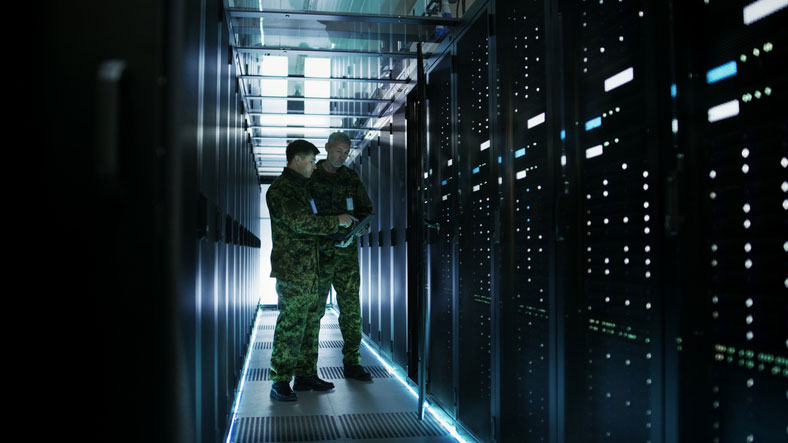
The appearance of U.S. Department of Defense (DoD) visual information does not imply or constitute DoD endorsement.
Information technology has been one of the defining features of the 21st century. It’s hard to imagine having a life now without social media, or ever leaving the house without our app-packed microcomputers in our pockets and tiny ear-buds tagging along.
The IT revolution has had just as much impact on the military. It used to be that just having bigger guns and more ammo was enough to win a war. Now we’ve come to a place where drones make precisions strikes while the pilot sits in an air-conditioned room half a world away, and where the possibility of cyberattacks are just as terrifying.
The electronic battlefield is contested just as fiercely as the landscape, with powerful sensors and jammers raging invisibly through the air. And let’s not forget about logistics… the secrets of supply and sustenance that are the real keys to victory in war. They’re managed by the military just as they are in the civilian world now, using RFID tags, elaborate databases, and just-in-time deliveries coordinated by encrypted networks and Excel spreadsheets.
That combination of civilian innovation and military necessity has made IT a big player in every branch of the modern American military.
Recruiters aren’t shy about this reality. When you look at the posters on the wall, it’s a bunch of big shiny images of motivated young men and women… working with computers. The message is clear: enlist today, and turn the training we give you into a hot civilian career in the IT sector.
And with the right combination of military training and a college degree in an information technology field, that’s exactly what you can do.
Explore Your Military Training and Degree Options
Military Information Technology Training Offers a Force Multiplier for Veterans

Information technology has always been a force multiplier for the American military. It amplifies combat potential, puts men and planes and ships in the right place at the right time.
The information technology sector itself owes a lot to the American military’s need for new innovation and new technologies. The first digital computers were built to calculate artillery trajectories and figure out advanced torpedo-aiming trigonometry. Even the need to track military personnel records led to punch card systems.
Today, information technology advantages are what win battles.
That same close relationship also acts as a force multiplier for American veterans today. Every branch of the service has a military occupational specialty rating in information technology; most of them have a whole family of related jobs, everything from network installers to microwave systems operators.
And the military doesn’t skimp on making sure you have the right training and tools for those jobs. When the difference between life and death for hundreds is a dot showing up on a missile operator’s screen at the right time, every effort goes into keeping the code, the computers, and the wiring in top shape for the job.
How Military Information Technology Training Builds Your Skills for Civilian IT Careers
 Military jobs in IT are just like every other military job: there are very specific job descriptions and standardized training requirements for all of them. The Navy doesn’t expect you to figure out how to dive a submarine without some instruction in buoyancy and pressure… and they don’t turn you loose on secure computer systems without training in operating systems and code bases.
Military jobs in IT are just like every other military job: there are very specific job descriptions and standardized training requirements for all of them. The Navy doesn’t expect you to figure out how to dive a submarine without some instruction in buoyancy and pressure… and they don’t turn you loose on secure computer systems without training in operating systems and code bases.
Even West Point offers a bachelor’s degree in Electronic and Information Technology Systems.
Military IT is unique in that it offers as many or more training opportunities for enlisted personnel as they do for officers. In most MOS (Military Occupational Specialty, branch-specific job codes) categories, the officers are the ones with the most technical training. But in information technology, most of the real day-to-day business of keeping computers running and networks updated falls to enlisted operators. And that means they have to have the skills for the job.
So right out of basic, you’re on your way to one of several dedicated military schools, depending on your branch:
Army
Most 25 series MOS fields, which deal with electronics and communications systems, receive 20 weeks of advanced training at the Signal Corps School in Fort Gordon, Georgia.
Navy
Information System Technician (IST) ratings receive 24 weeks of training at “A” school in either Groton, Connecticut (for submariners) or Pensacola, Florida.
Marine Corps
In the Marines, 06 series Communication Marines handle networking, programming, and computer support services. Depending on specialty, they may end up training at Marine Corps Air Ground Combat Center 29 Palms, in California, or at the Army’s Signal Corps School at Fort Gordon.
Air Force/Space Force
Today’s Air and Space Forces are almost entirely dependent on computer networks and information systems. Airmen and guardians in the 1D/3D AFSC range (17D for officers) typically receive between two and five months of training at the 81st Training Group at Keesler AFB in Mississippi.
Coast Guard
Information Technician ratings face one of the longest secondary training periods in the entire Coast Guard at the IT “A” school in Petaluma, California.
Just as good in today’s IT job market, many of these training programs come with industry-standard certifications baked in. Navy sailors coming out of IST “A” school already have their A+ and MCP (Microsoft Certified Professional) certifications, for instance.
Those are just introductory training periods, too. If you are in the service long enough, you’ll almost certainly be sent to longer and more involved training schools. In some cases, the service may even pay for some college training in IT.
Military IT Training Doesn’t Stop After You Are on the Job
 Information technology is a field that is constantly evolving. IT education doesn’t get a rest, either, then. You’ll have many ongoing opportunities to receive training throughout your time on active duty. As you advance in rank and responsibility, you will very likely be sent on to more advanced courses in system administration, networking, or programming at one of several schools.
Information technology is a field that is constantly evolving. IT education doesn’t get a rest, either, then. You’ll have many ongoing opportunities to receive training throughout your time on active duty. As you advance in rank and responsibility, you will very likely be sent on to more advanced courses in system administration, networking, or programming at one of several schools.
U.S. Army Signal School
Most advanced IT training in the Army means you’re going back to Signal School at Fort Gordon. Advanced courses last from 1 week to 30 weeks and include subjects like Information System Engineering, Network Systems, and WAN, CISSP, and Network Security and Monitoring.
Information Warfare Training Command
Corry Station at NAS Pensacola is where the Navy’s System Administration “C” School is located, teaching the System Administration or Journeyman’s Communication Course, for five and three months respectively.
81st Training Group
Located at Keesler AFB, this Air Force unit combines five different training squadrons offering some 400 different courses including client systems, cyber transport, and project management.
Marine Corps Communication Electronics School
Bravo Company of MCCES, located at 29 Palms, is responsible for offering advanced network and operating system administration training.
Coast Guard Information Systems Technician School
The Coast Guard “C” School in Petaluma offers specialized classes in information systems management and Avaya communication system administration ranging from 15 to 20 days in length.
There is also plenty of overlap between regular information technology support training and education and advanced cyberwarfare schooling in the service. After all, any computer system is vulnerable in time of war. Just like everyone learned to shoot an M-4 in boot camp, every military IT technician will learn the basics of information security and cyber defense.
This is ongoing throughout your time in the service. Through outfits like the Army’s Information and Communication Technologies Defense Division, all military IT staff will have security procedures and awareness constantly reinforced throughout their careers.
Of course, IT being IT, many of these trainings have gone virtual. You can take some of the shorter courses with the approval of senior leadership and your own computer from anywhere in the world.
Earning Your IT Degree While Still in the Service
Beyond even these advanced training programs, you will find military-run universities that offer actual degree programs in various IT-related disciplines. These are run by DoD or various branches and offer graduate degrees in a variety of highly technical fields:
- National Defense University
- National Cryptologic School
- Defense Acquisition University
- Air Force Institute of Technology
- Naval Postgraduate School
- National Intelligence University
- Defense Cyber Investigations Training Academy
Joint IT Operations Means Joint Training Options for Every Service
 World War II taught the American military the importance of cross-service cooperation. Navy ships were needed to ship supplies to Army divisions fighting halfway around the world; Marines needed instant communication for air support on landing beaches.
World War II taught the American military the importance of cross-service cooperation. Navy ships were needed to ship supplies to Army divisions fighting halfway around the world; Marines needed instant communication for air support on landing beaches.
Even though there is often inter-service rivalry, those lessons have stuck through the years. Now, “Joint” is the big buzzword in military operations. And nowhere is that more true than information technology. You can’t have networks that aren’t talking to each other when missiles are flying.
The upshot of all this is that there are plenty of cross-training opportunities between the services in information systems subjects. Sailors participate in training at the Army’s Fort Huachuca and Keesler Air Force Base; airmen are sent to Pensacola for course by Navy instructors.
So active duty members from every branch should be on the lookout for training options both in their own service and in schools run by other branches.
Assignment to these prestigious schools is competitive. It’s a coveted step on the path to promotion for field grade officer ranks over O-3. But it’s also a great way to get a unique kind of training in information technology while still in the service.
Some Billets Send Service Members to Civilian Universities for IT Education
There are also many aspects of information technology education that aren’t really specific to the military. In these cases, it’s not worth the time of defense universities to develop degree programs just for officers. If they want to develop expertise in those areas, they will often send you out to earn an advanced degree at a civilian school.
You remain in military service during this assignment, with full pay and benefits, but your only duty is earning the assigned degree. Tuition is typically, but not always, covered. Sometimes you’ll also have a stipend for books and supplies.
Programs that offer this type of degree opportunity include:
- Special Education Program / Advanced Degree Program - Marine Corps
- Advanced Civil Schooling - Army
- Technical Degree Scholarship Program - Air Force
You almost always have to make an additional commitment to serve longer in return for this lavish educational opportunity. But the experience that comes with that commitment is also valuable both in terms of promotion within the service and when it comes time to compete for jobs after your time in service.
COOL Covers the Cost of Certifications in Any IT Field
Depending on your branch, you may be earning certain basic industry certifications as a part of your specialization training. But IT is a field that never sits still. You can always stack more certs up for better qualification in your current role or to advance into even more technical areas.
To help you out with that, every branch offers a version of a DoD benefit program called COOL: Credentialing Opportunities OnLine. This is a killer program for IT fields, since the industry revolves around certifications and other kinds of credentials—sometimes even more than degrees.
According to IT job tracking firm Burning Glass, around 13 percent of IT job listings came with certification requirements… and holding those certifications came with an almost 18 percent pay bump.
COOL helps you identify credentials that you may be qualified for with your specific MOS. Then it walks you through the process of enrolling for the tests or courses required for that cert. On top of that, it will kick in up to $4,000 toward testing fees or training needed to get that credential.
COOL requires command approval, so you can’t just use it for something you’re interested in. But most leadership is all in favor of getting troops trained up in the latest and greatest in technology, so you shouldn’t have too much trouble getting approved for certs in your general field.
The Defense Activity for Non-Traditional Education (DANTES) Helps You Get College Credit for IT Training
 Formal military IT training has a lot of direct counterparts in American college courses on the subject. That makes it particularly well-suited for programs that can allow you to get college credits for military experience.
Formal military IT training has a lot of direct counterparts in American college courses on the subject. That makes it particularly well-suited for programs that can allow you to get college credits for military experience.
The most direct tool for this purpose is CLEP, the College Level Examination Program, offered for free to all service members through DANTES. By taking simple exams, you can validate your military training and many colleges will grant you credit for that training and apply it toward your IT degree.
Getting the Military To Pay For IT Training Before You Even Join Up
The military also recruits heavily from outside to bring in people who already have some level of IT training. You can turn this to your advantage by getting your branch to help pay you up front for a college degree in information technology.
Reserve Officer Training Corps Programs Are Happy To Pay For IT Degrees
ROTC is far and away the most generous of these pre-service educational benefits. In return for a service commitment of eight years (typically only four spent on active duty), you can get the military to pay up to four years worth of tuition. On top of that, money is offered for books and supplies, and you may even get a modest monthly stipend.
The Coast Guard doesn’t run an ROTC program, but they do have a similar program called the College Student Pre-Commissioning Initiative, which is also highly selective.
For the Army, you can pick almost any degree, but for the Air Force, Navy, or Marine Corps (which shares Navy ROTC), pursuing a degree in a technical field actually helps you make the grade. Each of those services has a list of areas in high demand that they give preference to when selecting candidates for ROTC scholarships. And guess what kinds of degrees are high on that list every year?
Military Academies Offer Four-Year Technology Degrees Valuable in Both the Military and Civilian World
Of course, the service academies have also gotten in on the act. Although they are hard to get into, they offer a full-ride scholarship, and basic technology instruction is now baked into officer training. You can also pick from a wide array of tech degrees at most of them now:
- Coast Guard Academy
- Operations Research and Computer Analysis
- Cyber Systems
- Air Force Academy
- Computer Engineering
- Computer Science
- Cyber Science
- Data Science
- Systems Engineering
- Naval Academy
- Computer Engineering
- Computer Science
- Cyber Operations
- Data Science
- United States Military Academy
- Information Technology
- Applied Statistics and Data Science
- Computer Science
- Cyber Science
- Systems Engineering
Enlisted Pre-Service IT Educational Benefit Options
Pre-service training for enlisted personnel is more limited. The military still wants your expertise, though, so there are definitely incentives for college training before you sign up.
Many of these incentives come your way as cash bonuses. Although they don’t directly contribute to your education, a sensible person might use them to pay down college loans!
On the other hand, there’s also the Student Loan Repayment Program (SLRP). If you have the right training and skills acquired through college, and have outstanding loans at the time you enlist, you may be able to negotiate to have the government pay them off. Details vary by branch and per enlistment contract.
IT Employers in the Civilian World are Sometimes Eager to Hire Military Vets
 Of all the jobs in the military, IT might have the most direct transferability to the civilian world. Big private companies and government agencies use exactly the same software and buy electronics from the same manufacturers. They have similar security concerns. They even have many of the same operational needs, from inventory to personnel management.
Of all the jobs in the military, IT might have the most direct transferability to the civilian world. Big private companies and government agencies use exactly the same software and buy electronics from the same manufacturers. They have similar security concerns. They even have many of the same operational needs, from inventory to personnel management.
In the civilian world, some of the highest salaries in the business go to individuals who develop deep expertise through degrees in some of these specialty areas:
Support and System Administration – Down in the trenches of IT, system administrators and computer support staff are the ones configuring server space, applying updates and patches, and picking up the phone when a user has a problem. Nothing happens without the day-to-day monitoring and maintenance work done by these professionals.
Networking – Most of the miracles of modern technology come through connectivity. But there’s a lot of complexity in electronic communications. Miles of wire and fiber optic have to be snaked. Routers and switches have to be configured. TCP/IP stacks have to be debugged, and weird wifi signal issues have to be sorted out. Military experts in these fields can do in office buildings the same things they did on the battlefield to address these issues.
Programming – Code drives everything that happens on every computer. That’s as true of military hardware as civilian systems; the F-35 fighter has some 8 million lines of code in its avionics platform. Although much of the coding the military does is outsourced to defense contractors, soldiers and sailors who code still work on a wide array of special purpose platforms. That experience is just as juicy on a resume as a job at Google.
Data Science – Big data has been the secret sauce in military campaigns against shadowy terrorist organizations. Sifting through phone records, satellite images, and bank transfers, military analysts have helped track some of the biggest threats in the world today. Those skills are needed by civilian companies doing everything from developing breakthrough energy products to marketing baby formula.
IT Management – Of course, every technology organization needs leadership. And anyone coming out of the military has a lot of potential for command and control roles in the civilian world. The chain of command instilled in each recruit, tied with a strong knowledge of IT practices and tools, gives any veteran a leg up in IT management roles.
The sheer diversity of technology jobs out in the civilian world can be a little overwhelming. But a college degree can both help you narrow down the best ways to apply your military IT training, and also solidify the other business and organizational skills you need in high tech today.
Respectable Salaries are Found in Information Technology
All the rumors are true: the specialized training required for a career in information technology can come with a respectable salary.
It’s also a field that offers a huge variety of different paths. There are new specialties and sub-specialties popping up almost daily.
Military Training Forges Future Entrepreneurs in Information Technology
 Putting Army and Marine Corps veterans together can be a dangerous mix in a bar. But when it comes to business, it turns out to be a pretty great combination.
Putting Army and Marine Corps veterans together can be a dangerous mix in a bar. But when it comes to business, it turns out to be a pretty great combination.
That’s what two former U.S. Army soldiers and a former Marine intelligence analyst found out when they got together and founded Red Owl, a Baltimore-based cybersecurity startup. The concept behind Red Owl combined common military intelligence tools in sentiment analysis with high-tech computerized pattern-matching.
The product would sift through email and other activity logs at sensitive businesses like banks and trading firms to identify employees at risk for engaging in inside training or other security breaches… before they did it.
Red Owl’s founders credit their military background not just for the technical skills to execute the concept, but also for the attitude and initiative to deal with the complexities of entrepreneurship.
But Red Owl isn’t a tiny startup anymore. The company was acquired by big security service firm Forcepoint in 2017.
But even if you stick with the most common kinds of jobs in IT today, salary and employment prospects can be solid. Matching these kinds of jobs with the various degree disciplines we talked about earlier helps paint the picture:
- Management
- Computer and Information Systems Managers - $159,010
- Networking
- Computer Network Architects - $120,520
- Network and Computer System Administrators - $80,600
- Programming
- Computer Programmers - $93,000
- Web Developers and Digital Designers - $77,200
- Support and System Administration
- Computer Support Specialists - $57,910
- Network and Computer System Administrators - $80,600
- Computer Systems Analysts - $99,270
- Information Security Analysts - $102,600
- Data Science and Database Administration
- Data Scientist - $108,660
- Database Administrators and Architects - $98,860
- Computer and Information Research Scientists - $131,490
Not only are the pay scales respectable, but so is demand. Job growth of up to 33 percent is expected in some of those fields between 2020 and 2030.
Choosing the Best Military Friendly University for Your Information Technology Degree
 Transitioning to civilian life from the structured world of the military can be a challenge. The military gives you plenty of help through the process these days, with the mandatory Transition Assistance Program walking you through the details.
Transitioning to civilian life from the structured world of the military can be a challenge. The military gives you plenty of help through the process these days, with the mandatory Transition Assistance Program walking you through the details.
When it comes time to pick a school to round off your IT education, you’re going to have to make your own choices, however. A lot will depend on both your military background and on the career path you plan to follow.
But there are still many ways that the military will support you along the way.
GI Bill® Approval Is a Bare Minimum Requirement for Military Friendly Universities
The number one thing that makes a school military friendly is approval for GI Bill® tuition payments. The GI Bill® is the single biggest post-discharge educational benefit that most American veterans are eligible for. If you find a school that doesn’t take it, run, don’t walk, the other direction.
That’s because schools approved for GI Bill® funding have to meet stringent standards in both educational quality and stability. They all hold accreditation from an agency recognized by the Department of Education, and they very often offer specialized service just for vets on top of granting credit for military experience.
Universities That Offer the Yellow Ribbon Program Help Veterans Pay For Out-of-State and Private Education
Like other raging career fields, there are definitely regions and cities in the country that are hot spots for information technology jobs. Silicon Valley, Puget Sound, Austin, Atlanta… all of them are glowing red on any kind of job search or top salary graph you might look at.
These job trends are not separate from regional universities. In fact, they are often completely tied together. Research breakthroughs lead to new startups, lead to investments, lead to big paychecks.
So getting your degree at the right university may be a key to getting in on the ground floor at the job you want. Networking, research opportunities, and coursework taught by the best professors depend on it.
GI Bill® benefits only cover in-state tuition at 100%, or a fixed amount of about $26,380 per year at foreign and private schools. That comes up short if you move to one of those hotspots, or feel like a top-notch private school would be your best bet.
The VA and many of those schools have teamed up to give you an option to get full tuition coverage in those cases anyway. Called the Yellow Ribbon program, it allows schools to designate an amount they are willing to contribute toward veteran’s tuition, and how many vets they are willing to support that way. Then the VA matches the contribution.
In most cases, that’s enough to keep you from having any out-of-pocket expenses, even at the best tech schools in Silicon Valley.
Forever GI Bill® Benefits Provide an Added Boost to Your IT College Education
Information technology is just a super-intensive and difficult field of study, there’s no way around it. The whole field is constantly evolving, and the depth of expertise required can be staggering. This can make traditional four-year degrees a little bit outmoded for IT careers. A lot of people may take longer than the typical 36 months you have with the GI Bill® to complete a program in really challenging subjects. Or they might be better served with an intensive bootcamp or other focused, short-term program that doesn’t fall into traditional GI Bill® coverage.
Once again, though, the VA comes to the rescue through a program passed in 2017 called the Forever GI Bill®. This program offered a lot of tune-ups to the regular Post-9/11 GI Bill®, but it also included a couple of completely new provisions specifically aimed at STEM students like IT specialists.
The Edith Nourse Roger’s STEM Scholarship extends Post-9/11 GI Bill® benefits for students enrolled in computer and information science programs that are already eligible for GI Bill® benefits. You can get as much as an additional six months of benefit coverage worth up to $30,000 total. This is great if you need to take a little extra time or some specialized classes that would throw off your graduation timeline.
The pilot VET TEC program offers VA funding to cover tuition and housing for non-traditional technology training programs that are offered by approved training providers. This covers specialist training and other new and emerging high-tech education options that might not fall under traditional GI Bill® covered college programs. Using this benefit doesn’t draw down your GI Bill® eligibility, so it’s the perfect option to build up your expertise before pursing a full degree.
Using Resources From the Department of Veterans Affairs To Find Military Friendly Schools With Information Technology Programs
The easiest way to find schools that are military friendly is through the VA’s GI Bill Comparison tool. This online reference allows you not only to identify schools where your benefits will be accepted, but also how much they are worth. You can also see if schools have other features of special interest to veterans, including:
- If they offer credits for military training
- Whether special tuition rates or enrollment policies are offered to veterans
- How many other GI Bill® users are in attendance
- Whether a veteran’s support group is active on campus
What to Expect from Coursework and Electives in IT Degrees at Every Level
Your decision of which college to attend will also revolve around what area you want to specialize in. Different schools have different strengths in IT. You’ll take those into account as you determine where to apply as well.
At military friendly colleges, your experience in the service will be an asset on your application. Your training will help fill prerequisites for degrees at any level. Even if that training didn’t include anything related to IT, military friendly universities routinely grant credit toward general undergraduate requirements for certain military experience and training.
Associate Degrees in Information Technology for Military Veterans
At the two-year degree level, degrees in IT prep you for basic troubleshooting, support, and maintenance work. You’ll have classes that cover a lot of fundamental concepts in networking, computation, software, and information security. But just as importantly, most associate programs offer tried-and-true education in the liberal arts: English, social studies, basic sciences, and history. These courses may not seem directly related, but they improve your communication skills, and they lay the groundwork for further studies at the bachelor’s level and beyond. An associate degree may be accepted as your first two years in a bachelor’s program.
Bachelor’s Degrees in Information Technology for Military Veterans
Bachelor’s degrees are considered the key level of qualification in just about every information technology field. These four-year programs have the time and breadth to dive into some of the various specializations and offer you a reasonable degree of expertise in IT. On top of that, they up the ante on liberal arts courses. Not only does that general education build your written and verbal communication skills, but also serves to hone your problem-solving and critical-thinking abilities. That’s crucial in any IT job.
Master’s Degrees in Information Technology for Military Veterans
Another two years of advanced studies in information sciences can earn you a master’s degree. These programs are almost always highly specialized in a specific field of IT, and you leave behind most of the general education requirements. Instead, almost your entire course of study dives deep into technology and theory in your focus area. You’ll perform original research and use it to inform your thesis, an intensive writing and investigative exercise that develops your own ideas in the field.
Doctoral Degrees in Information Technology for Military Veterans
Doctoral degrees in IT prepare graduates for roles in teaching or advanced research and development. These programs can last from three to five years. Most of your study during that period will be self-directed, in consultation and cooperation with your professors. Doctoral students are expected to devote significant time to research and coming up with breakthrough ideas. As much as half your time in these programs will be devoted to your doctoral dissertation, a unique paper explaining your thoughts that will define your career to come.
Information Technology College Coursework Can Build on IT Skills You May Have Developed in the Military
Most information technology degrees allow some degree of specialization. And different schools all bring their own brand of expertise to the forefront. You will find various philosophies and skills rise to the top at different programs. In general, though, you can expect courses that touch on these essential areas of technology education:Computer Concepts and Applications – Veterans should breeze through these courses with a solid backdrop of military IT training in the basics of computer science: what a processor is, how memory and hard drives work, the computer bus that brings it all together.
Information Systems – You will also look at big-picture aspects of information theory as well as practical applications of large-scale information processing systems. Emergent properties like social networks and virtual reality will be covered.
Network Technology – Connectivity between computers and servers are essential to the benefits of IT in the world today. Every IT degree program will cover basic OSI (Open Systems Interconnection) protocol layers, types of connections, and routing principles.
Programming – Even system administrators need a familiarity with basic programming concepts. You’ll learn about languages, scripting, and various considerations for evaluating or creating computer programs.
Algorithms and Data Structures – Information isn’t much good unless you have ways to store and process it. That’s the work of algorithms and databases. You’ll learn why they are essential and what the basic types and use cases are.
Security – Of course, all of the above are subject to compromise by both careless and malicious entities. Your military training will serve you well in college courses in computer security, since it’s a continuing and vital part of every service’s IT education.
These all come along with dozens of elective choices, in areas such as:
- Management Support Systems
- E-commerce
- Systems
- Ethics
- Management
- Hardware
- Graphics
Of course, the coursework you have will be shaped a lot by the specialization you pursue, if any. You might have more classes in one of the subjects above, or go off in a different direction. A specialized college degree in IT dives deep into the specifics devoted to mastering each of these subjects. You’ll find concentrations available in all the career areas we listed above, not to mention dozens of sub-disciplines for each.
Veterans Have More to Offer Employers Than Just Technical Knowledge
 All of the training and experience you bring to the table as a veteran seeking a degree and a career in the IT field are just part of the package you offer employers. Veterans often receive preferential hiring, both in government and private sector jobs. That’s not just a way of saying thank you for your service.
All of the training and experience you bring to the table as a veteran seeking a degree and a career in the IT field are just part of the package you offer employers. Veterans often receive preferential hiring, both in government and private sector jobs. That’s not just a way of saying thank you for your service.
Instead, it’s recognition that service has made you some who stands apart. You’ve developed maturity, discipline, and communication skills through your time in the military. You are someone who has self-confidence and assertiveness, a take-charge attitude that will get the job done. You know what it means to make a promise, and you know how to deliver on it.
These are the ultimate job skills, and earning a degree is just putting a capstone on those qualities. With that information technology degree in hand, you could be a strong candidate in one of the hottest fields in the private sector today.
2021 US Bureau of Labor Statistics salary and job growth figures for Computer and Information Technology Occupations reflect national data not school-specific information. Conditions in your area may vary. Salary and job growth data accessed in June 2022.





